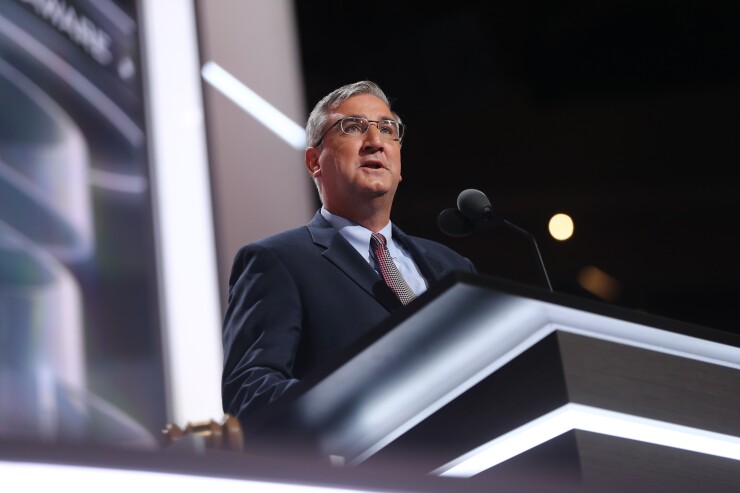Indiana Gov. Eric Holcomb announced that he
Holcomb’s administration was required to study tolling under the road-funding plan the Indiana legislature passed in 2017. The idea was widely unsupported by citizens, with only one in five approving of interstate tolling, according to the 2018 Old National Bank Ball State University

Holcomb said there may be good reason to revisit tolling in the future.
"Traditional means of funding infrastructure will diminish sometime in the future and we must continue to analyze innovative funding methods,” Holcomb said Thursday in a letter addressed to budget committee members. Holcomb unveiled a
Indiana's
Toll roads can be a successful financial tool but many people don't like paying tolls, a quandary on display at this week's Bond Buyer Transportation Finance/P3 Conference in Dallas.
“Everybody has a funding problem so why don’t we just toll the interstate,” Vince Dolan, managing director at KPMG LLP, said Thursday at the conference. “I think that is a very simple beginning answer but I think that as soon as you scratch the surface then you are going to start to get a lot more pushback on that.”
Dolan said that in Texas supporters of tolling are struggling with the need for additional toll roads in many areas but the overarching number of people who don’t live in those areas are against toll roads as a principle. “As we move forward we will continue to see an interest in toll roads and expansion but some of the tools have been restricted to various agencies,” he said.
Carlos Contreras, president of traffic and revenue forecaster C&M Associates, said that the impact of toll infrastructure in the North Texas region has helped the growing region keep up with transportation demand.
“The situation in North Texas is interesting,” said Contreras. “They have 100,000 people coming to the area every year and over the last six years that trend has continued but congestion has remained stable. The reason why is because this region has continued investing in transportation projects and primarily that investment has been toll infrastructure, that is what has made it possible.”
Contreras said that Virginia lawmakers are conducting a feasibility study on tolling to pay for transportation projects across the state. Construction projects include widening portions of the interstate to three lanes, extending acceleration and deceleration lanes and widening shoulders. Other proposed solutions include installing cameras that could detect incidents faster and adding changeable message signs to inform motorists in real-time about traffic issues.
The proposal is to toll trucks less than 17 cents per mile and toll other vehicles one-third to two-thirds of the truck toll rate. Tolls would be higher during the day and lower at night. The tolls would be collected without toll booths.
Contreras said that Northern Virginia has had a very successful managed lane network.
"The Hampton Roads area in the south has also large transportation program of investments but then the more rural section on the west asked, 'What about us?' and went to legislature and said they were open to contemplating tolling,” he said.
Alex Zaman, a director at Citi, said overall the toll road sector continues to see positive trends and the rating agencies continue to maintain stable outlooks on the sector. Zaman said that rating agencies have also begun to show a bit more optimism with regard to the potential for managed lane networks and systems.
“We really haven’t got a sense of the resilience of many of this projects in the managed lane sector other than promise of early returns,” Zaman said. “So I think that in the next few years will be really interesting as sector evolves and matures.”





